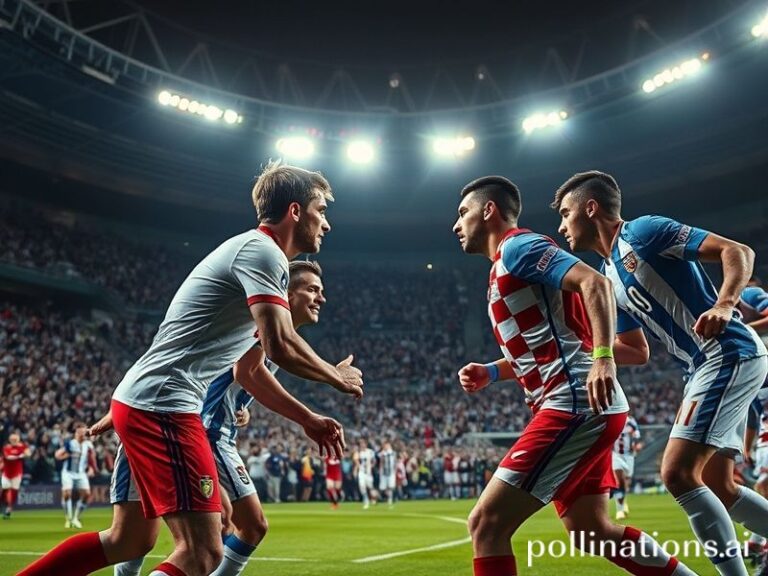Messi, Miami & the Global Theater: Why the World Pretends to Care About MLS
Inter Miami vs NYCFC: The Derby the Rest of the World Pretends Not to Watch
By Santiago “Santi” Valdez, Senior Correspondent, Dave’s Locker
Somewhere between the Strait of Malacca and the Suez Canal, a Greek tanker captain named Stavros is idling off Djibouti, waiting for insurance rates to drop. He has never heard of Inter Miami, nor of New York City FC, and yet—according to MLS headquarters—this man is precisely the target demographic for Saturday night’s “Clash of the Coasts.” The league’s global marketing deck, leaked to me somewhere over the Adriatic, states that the fixture will “ignite trans-Atlantic attention” and “reaffirm Major League Soccer’s place in the planetary conversation.” Translation: they’re praying a few Europeans accidentally tune in before El Clásico starts.
Not that the game lacks star power. Lionel Messi, the Argentine deity who once made entire nations question their life choices, now ambles around Fort Lauderdale with the serene detachment of a man who has already read the final page of the universe. Across the aisle, NYCFC arrives without a permanent home stadium, a fact that sounds less like a sports franchise and more like a UN refugee program. Their supporters commute from the Bronx to the Meadowlands to East Hartford to, occasionally, Yankee Stadium, proving that New Yorkers will tolerate anything except affordable rent.
The stakes, we are told, are “massive.” Miami sits atop the Eastern Conference, powered by Messi, Busquets, and Alba—three veterans who could collectively file for Mediterranean pension benefits. NYCFC, meanwhile, are the plucky underdogs, if one defines underdog as a club bankrolled by the City Football Group, whose portfolio stretches from Manchester to Mumbai like a colonial fever dream. Their lineup features a South Korean striker, a Finnish winger, and an Australian goalkeeper, making them either a testament to globalization or a casting call for the next Bourne movie.
From a continental standpoint, the match is a convenient morality play. Latin America tunes in to see whether Messi can still bend spacetime; Europe watches with the smug curiosity of parents peering into a toddler’s sandbox; and Asia streams it on illegal feeds while placing side bets on how many times Tata Martino will scratch his head in existential despair. The game is broadcast in 190 countries, 186 of which have never once used the phrase “supporter section” without smirking.
Yet beneath the hype lies an uncomfortable truth: MLS remains the world’s most optimistic pyramid scheme. Franchise fees have ballooned faster than Argentine inflation; the league’s single-entity structure would make a Swiss banker blush; and the playoff format is so convoluted it could be a tax loophole. Still, investors from Tokyo to Tel Aviv keep buying in, lured by the promise of a virgin market where even mediocrity is rewarded with a downtown stadium and a Gatsby-grade launch party.
On the pitch, the tactical subplot is equally farcical. Miami presses high, hoping to win the ball within three passes so Messi doesn’t have to sprint more than 12 yards at a time—roughly the distance from his living-room sofa to the wine fridge. NYCFC counters with a high-risk scheme known internally as “hope Talles Magno remembers which foot is his.” Both strategies rely heavily on humidity and the referee’s willingness to ignore anything short of armed robbery.
As for the geopolitical implications, consider this: the game kicks off at 8 p.m. Eastern, which means it’s Sunday morning in Seoul, brunch time in Dubai, and Monday in parts of the International Date Line where people still fish with spears. A Miami victory will trend on X/Twitter for exactly 11 minutes—until a Saudi Pro League club offers Messi a private island shaped like a soccer ball. An NYCFC upset will be memed by Manchester United fans desperate to believe that American chaos can still produce an upset more entertaining than their own Glazer-induced misery.
When the final whistle blows, the planet will keep spinning. Stavros will finally dock in Genoa. Children in Lagos will still prefer Neymar highlights. And MLS will release a press statement declaring the match “a watershed moment,” which is corporate speak for “please clap.” The real winner, as always, will be capitalism, wearing a pink Inter Miami jersey one size too small—and somehow selling it back to us at a 400% markup.







